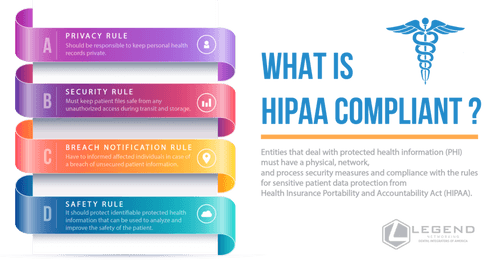The Health Insurance Portability and Accountability Act (HIPAA) was passed by Congress in 1996. This Act sets the rules for sensitive patient data protection. Entities that deal with protected health information (PHI) must have a physical, network, and process security measures in place and follow them to ensure HIPAA Compliance.
How HIPAA Helps?
HIPAA is beneficial in protecting the confidentiality and security of health information and provide individuals with certain rights to the information about their health. It makes it mandatory across the industry to maintain standards with respect to healthcare information related to billing and associated processes. As a result, there are fewer health care frauds and abuse. HIPAA has been instrumental in proving people with the ability to transfer and still continue their health insurance coverage while they change or lose jobs.
What are the HIPAA Rules?
HIPAA plays a crucial role in protecting the privacy and security of patient information. For this, it has laid four rules:
-
HIPAA Privacy Rule:
Healthcare data is personal to every patient. Everyone has the right to keep their personal health records private, and every business entity should be responsible for ensuring that no unauthorized person gets access to the patient files. Since the healthcare data is available in many mediums, paper, electronically, etc., a lot needs to be done to prevent them from getting into unauthorized hands.
-
HIPAA Security Rule:
According to HIPAA Security Rule, every entity, including Dentists, must keep patient files safe from any unauthorized access during transit and storage. It specifies safeguards that cover businesses to maintain confidentiality, integrity, and availability of the patient files. It also requires businesses to develop, implement, and maintain appropriate security measures that can protect the security of electronic files they create, receive, maintain, or transmit.
-
HIPAA Breach Notification Rule:
This rule requires covered entities to informed affected individuals in case of a breach of unsecured patient information. It refers to an impermissible use or disclosure that compromises the security or privacy of the patient’s data.
-
Patient Safety Rule:
This rule aims at protecting identifiable protected health information that can be used to analyze and improve the safety of the patient.
With HIPAA in the picture, it becomes crucial for Dentists to comply with HIPPA rules, or they will be audited, and if found guilty, will be penalized.
Dental records, whether on paper or electronically, are considered PHI. Though they contain minimum medical information, they are still subject to the same scrutiny for HIPAA compliance.



